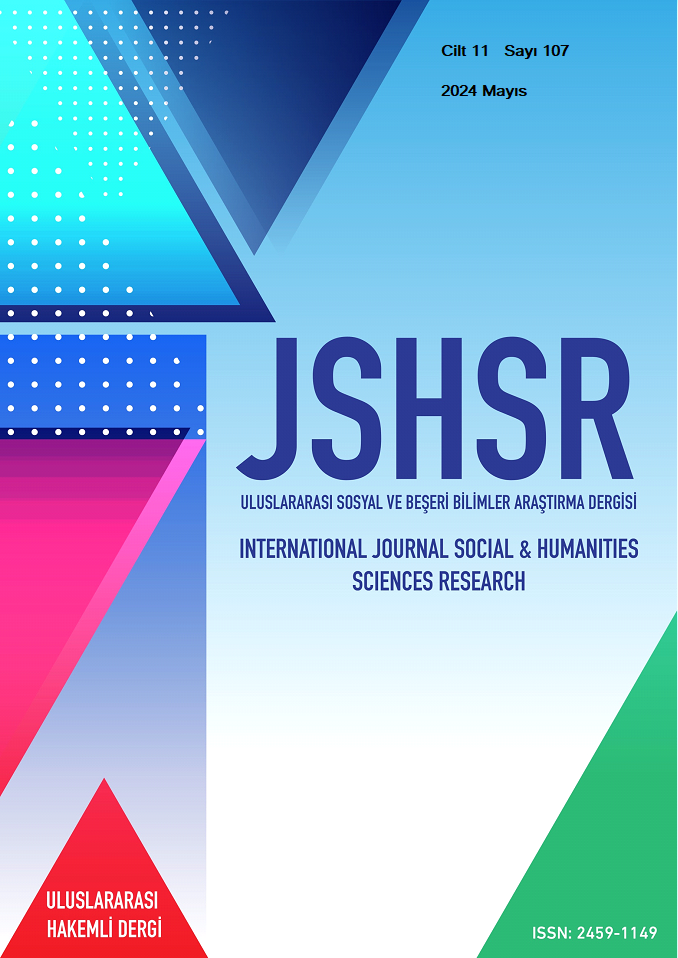A Research on the Effect of Demographic Factors on Psychological Resilience
DOI:
https://doi.org/10.5281/zenodo.11404702Keywords:
Psychological resilience, Demographic factors, Hypothesis testingAbstract
This study aims to examine the effects of demographic factors on individuals' psychological resilience levels from a multifaceted perspective. Psychological resilience is an important concept that expresses the adaptation behavior and recovery ability of individuals against challenging life events and stress factors. The research addresses the effects of demographic variables such as age, gender, marital status and education level on psychological resilience. The sample of the study consists of employees of a public hospital in Muğla province, and data was obtained through a survey from 250 healthcare workers using convenience and snowball sampling techniques during the data collection process. The data obtained was analyzed through Jamovi and AMOS 22 package programs.
The findings of the study show that age has a significant impact on psychological resilience, especially individuals between the ages of 41-50 have higher levels of resilience. Contrary to expectations, marital status did not have a significant effect on psychological resilience. It has been determined that women have higher levels of psychological resilience than men, and this is explained by the fact that women use social support mechanisms more effectively. The effect of education level on psychological resilience was not found to be statistically significant.
In conclusion, the effects of demographic factors on resilience are complex and multifaceted. The study provides important findings, especially for the development of strategies to increase the resilience of healthcare professionals. The findings of the research include measures to be taken at individual and institutional levels and policy recommendations to increase social welfare.
References
Arrogante, O., & Aparicio-Zaldívar, E. (2017). Resilience and burnout among intensive care unit professionals. Intensive and Critical Care Nursing, 43, 81-87. https://doi.org/10.1016/ j.iccn.2017.03.003
Bariola, E., Lyons, A., Leonard, W., Pitts, M., Badcock, P., & Couch, M. (2015). Demographic and psychosocial factors associated with psychological distress and resilience among transgender individuals. American Journal of Public Health, 105(10), 2108-2116. https://doi.org/10.2105/ AJPH.2015.302763
Bonanno, G. A., Neria, Y., Mancini, A., Coifman, K. G., Litz, B., & Insel, B. (2007). Is there more to complicated grief than depression and posttraumatic stress disorder? A test of incremental validity. Journal of Abnormal Psychology, 116(2), 342-351. https://doi.org/10.1037/0021-843X.116.2.342
Doğan, T. (2015). The validity and reliability study of the single dimension psychological resilience scale. Klinik Psikiyatri Dergisi, 18(1), 29-36.
Field, A. (2009). Discovering statistics using SPSS (3rd ed.). SAGE Publications.
Gürbüz, S., & Şahin, F. (2016). Sosyal bilimlerde araştırma yöntemleri: Felsefe-yöntem-analiz. Seçkin Yayıncılık.
Kunzler, A., Helmreich, I., Chmitorz, A., König, J., Binder, H., Wessa, M., & Lieb, K. (2020). Psychological interventions to foster resilience in healthcare professionals. Journal of Occupational Health Psychology, 25(2), 129-142. https://doi.org/10.1037/ocp0000174
Lee, J. H., Nam, S., Kim, A., Kim, B., Lee, M., & Lee, S. M. (2013). Resilience: A meta-analytic approach. Journal of Counseling and Development, 91(3), 269-279. https://doi.org/10.1002/j.1556-6676.2013.00095.x
Lowe, L. (2015). The intimacies of four continents. Duke University Press.
Lwanga, S. K., & Lemeshow, S. (1991). Sample size determination in health studies: A practical manual. World Health Organization.
Nurses, Y.-P., Ahorsu, D., Chen, J.-S., Lee, C., Lin, C.-Y., & Griffiths, M. (2021). Resilience among nurses: The role of demographic factors, mindfulness, and perceived stress. Journal of Nursing Management. Advance online publication. https://doi.org/10.1111/jonm.13314
Ran, L., Wang, W., Ai, M., Kong, Y., Chen, J., & Kuang, L. (2020). Psychological resilience, depression, anxiety, and somatization symptoms in response to COVID-19: A study of the general population in China at the peak of its epidemic. Social Science & Medicine, 262, 113261. https://doi.org/ 10.1016/j.socscimed.2020.113261
Sakız, H., & Aftab, M. (2018). Academic achievement and psychological resilience among students in Turkey. Education and Science Journal, 43(194), 197-209. https://doi.org/10.15390/EB.2018.7437
Saunders, M., Lewis, P., & Thornhill, A. (2009). Research methods for business students (Z. Aycan, Ed. & Trans.). Nobel Yayın Dağıtım. (Original work published 2007)
Schaefer, A., Kong, R., Gordon, E. M., Laumann, T. O., Zuo, X. N., Holmes, A. J., ... & Yeo, B. T. (2018). Local-global parcellation of the human cerebral cortex from intrinsic functional connectivity MRI. Cerebral Cortex, 28(9), 3095-3114. https://doi.org/10.1093/cercor/bhx179
Tran, T. V., Chun, T. W., Lee, H. H., Kim, H. G., & Nho, E. C. (2013). Resilience among Austrian survivors of World War II. Journal of Traumatic Stress, 26(6), 725-732. https://doi.org/ 10.1002/jts.21868
Wu, G., Feder, A., Cohen, H., Kim, J. J., Calderon, S., Charney, D. S., & Mathé, A. A. (2013). Understanding resilience. Frontiers in Behavioral Neuroscience, 7, 10. https://doi.org/10.3389/ fnbeh.2013.00010
Wu, S., Sun, F., Zhang, W., Xie, X., & Cui, B. (2022). Resilience among nurses in Taiwan. Journal of Nursing Management, 30(3), 450-459. https://doi.org/10.1111/jonm.13343
Downloads
Published
How to Cite
Issue
Section
License
Copyright (c) 2024 INTERNATIONAL JOURNAL OF SOCIAL HUMANITIES SCIENCES RESEARCH

This work is licensed under a Creative Commons Attribution 4.0 International License.


